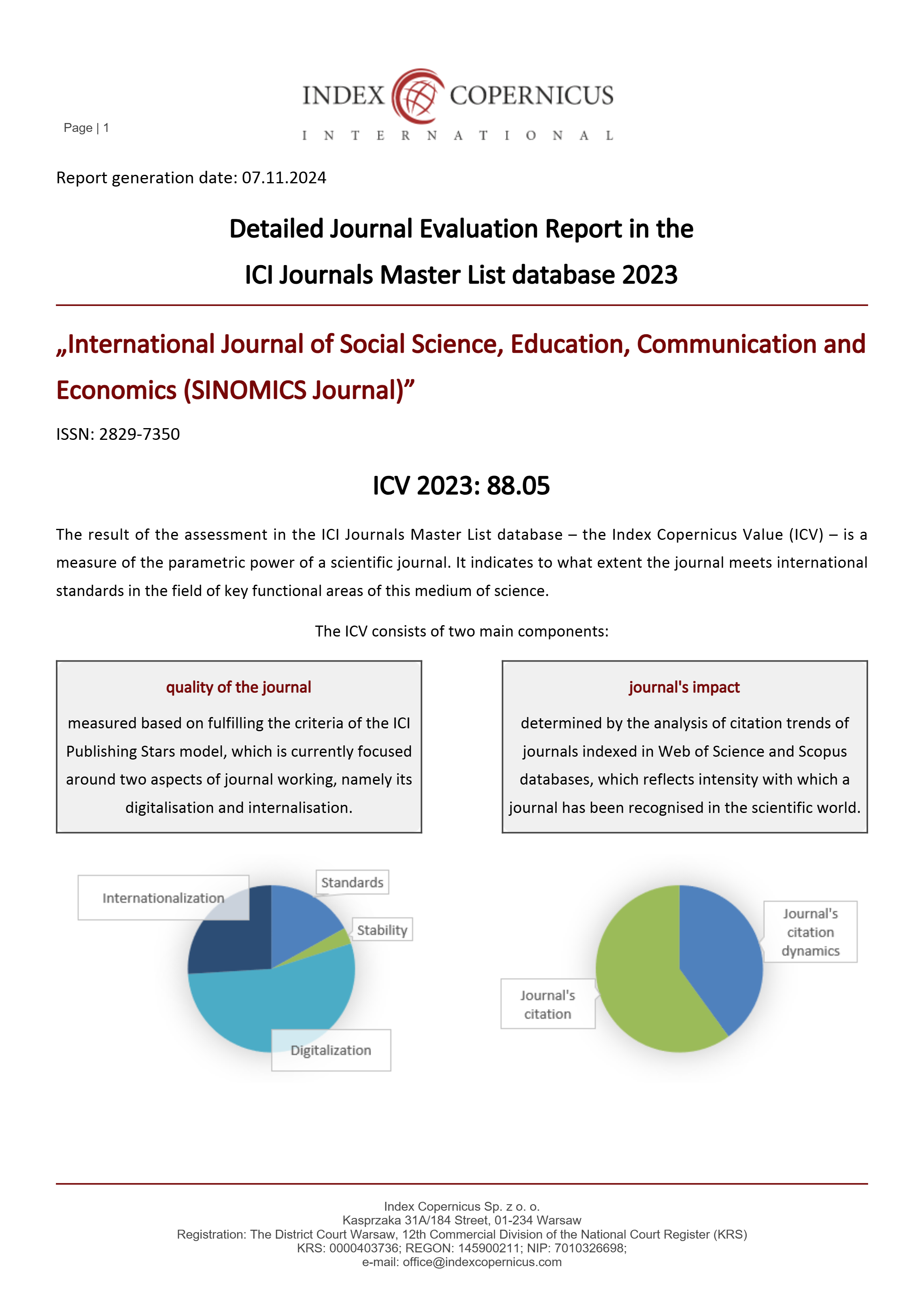The Influence of Self Esteem on Smartphone Addiction with Academic Stress as Mediator Variables in Class XI Students Using Smartphones at SMA Negeri 12 Jakarta
Main Article Content
Rachmi Windicha Fitri
Adam Arya Haninditya
Vira Arini Ridwan
This research is a quantitative study which aims to examine the influence of Self Esteem on Smartphone Addiction, the influence of Self Esteem on Academic Stress, the influence of Academic Stress on Smartphone Addiction, and the influence of Self Esteem and Academic Stress on Smartphone Addiction. The subjects in this research were class XI students at SMA Negeri 12 Jakarta, totaling 140 samples using the Simple Random Sampling technique. This research uses 3 measuring instrument scales, namely: the Self Esteem variable measuring instrument scale, the Academic Stress variable measuring instrument scale and the Smartphone Addiction variable measuring instrument scale. The results of this study show that, 1) There is a significant influence between Self Esteem on Smartphone Addiction with r = -0.26 and t = -3.30 (t > 1.96), 2) There is a significant influence between Self Esteem on Academic Stress with r = - 0.33 and t = - 4.12 (t > 1.96), 3) There is a significant influence between Academic Stress on Smartphone Addiction with r = 0.29 and t = 3.66 (t > 1.96) 4) Academic Stress functions as a Mediator on the Influence of Self Esteem on Smartphone Addiction with r = -0.105 and t = -2.375 (t >1.96).
Andarini, Sukma Susandari, & Dewi Rosiana. (2012). “Hubungan antara Self Esteem dengan Derajat Stress Pada Siswa Akselarasi SDN Banjarsari 1 Bandung”. Jurnal Sosial, Ekonomi dan Humaniora. Vol. 3 (1). 217-224
Archarya, Pandey R. & Chalise HN. (2015). “Self-Esteem and Academic Stress among Nursing Students”. Kathmandu University Medical Journal. Vol 13 (4). 300.
Baron, Robert A. & Byrne, Donn. (2003). Psikologi Sosial. Edisi kesepuluh, jilid 1 Jakarta : Erlangga
Bian, M. & Leung, L. (2007). “Linking Loneliness, Shyness, Smartphone Addiction Symptoms, and Patterns Of Smartphone Use to Social Capital” Social Computer and Review. 1-19
Bianchi, A & Phillips, J.G. (2005). “Psychological Predictors of Problem Mobile Phone Use” CyberPsychology & Behavior. Vol 8 (1). 41.
Cahyanti, Ika Yuniar dan Abram Karuniawan. (2013). “Hubungan antara Academic Stress dengan Smartphone Addiction pada Mahasiswa Pengguna Smartphone”. Jurnal Psikologi Klinis dan Mental. Vol 2 (1). 16-21
Griffiths, M. (2005).” A ‘components’ model of addiction within abiopsychosocial framework”. Journal Subtance of Use. Vol 10 (4). 191-197
Iqbal, Muhammad & Nurdiani, Gadis (2016). “Is Smartphone Addiction Related To Loneliness?”. Specialty Journal of Psychology and Management. Vol 2 (2) 1-6.
Kasetyaningsih, Sufia Widi. (2015). “Pengaruh Aplikasi Islami di Gadget Terhadap Sisi Religiousitas Mahasiswa”. Vol 9 (2). 19-27.
Noor, Achmad Rouzmi. (2015). Begini Profil Pengguna Smartphone di Indonesia. (diakses 10 April 2017). https://inet.detik.com/cyberlife/d-3083415/begini-profil-pengguna-smartphone-di-indonesia
Santrock, J.W. (2006). Life Span Development. New York : Mc Graw Hill
Sarafino, Edward P. & Smith, Timothy W. (2012). Health Psychology: Biopsychosocial Interactions. Seventh Edition. Danvers : John Wiley & Sons
Sarwar, Muhammad. & Soomro, Tariq Rahim. (2013). “Impact of Smartphone’s on Society”. European Journal of Scientific Resarch. Vol 98 (2). 216-226
Taylor, Shelley E. (2012). Clinical Health Psychology Attitude to Health Disease—Psychology Psycholophysiologic Disorders. New York : Mc Graw Hill
Tran, D. (2016). “Classifying 1-23 Nomophobia as Smart-Phone Addiction Disorder” UC Merced Undergraduate Research Journal. Vol 9 (1).










